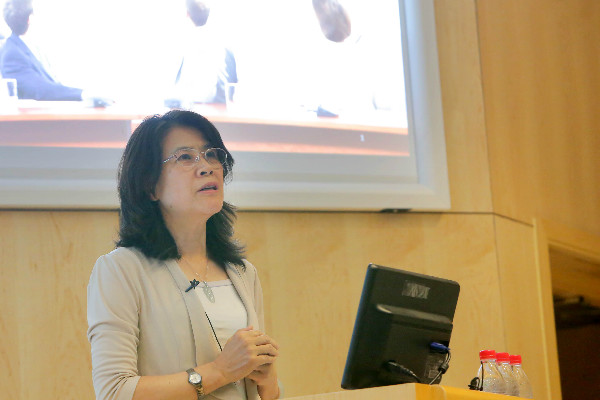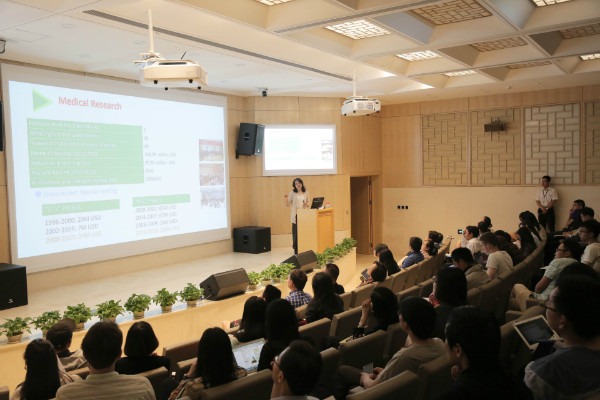On May 11th, 2016, Professor Ke Yang, Executive Vice President of Peking University and Foreign Fellow of the U.S. Academy of Medical Science, gave a speech titled “The Development and Challenges of Medical Technology” to Yenching Academy as part of the China Studies Lecture Series.
Professor Ke Yang has extensive experience in her field and advises the government on medical issues as a member of the National Political Advisory Committee. During this lecture, Professor Ke shared her insight on the medical industry and reflected on its role in society from her role as an educator and a mother.

First, on the development of medical technology, Professor Ke explored the advance of medical diagnosis and treatment.
Our medical technology has improved dramatically over the past 100 years, particularly in the fields of emergency treatment, life maintenance, organ repair and pain relief. However, there is a chiasm between disease diagnosis and disease treatment. Many diseases are discovered but cannot be immediately treated. We can prolong life but not necessarily eradicate disease.
Professor Ke also raised a question to the audience: In spite of our recent technological advance, are we forgetting something with medicine? Professor Ke in turn explored three challenges to the current medical industry.

First is the problem of over-treatment. As humans, our body has the ability to adapt and auto-repair. Disease comes when our immunity system is suppressed. Doctors’ goal should be to help patients regain their own immunity system. However, the current medical technology often further suppresses our body’s repair system. For example, 74% of Chinese patients use antibiotics, much higher than the 30% recommended by the WHO. This overreliance on drugs weakened our body and created many super-viruses immune to traditional antibiotics.
The second challenge is the change brought by the proliferation of machines. Dr. Trudeau, a famous American doctor, once said that a doctor’s goal should be to “heal sometimes, help often but always comfort.” Some of our human needs, like the need for comfort, can never be satisfied by machines. In the current medical industry, where machines play such an important role, we often focus exclusively on the physical effects of a disease and sometimes overlook the mental needs of the patients. The development of technology can cause a perverted relationship between doctors and patients.

The last challenge returns to the ultimate purpose of medicine. Contemporary doctors have such a thankless job and often save patients’ lives without ever receiving their due gratitude. This is because medical technology is replacing the traditional relationship between doctors and patients.
For example, when a senior citizen receives a major operation, wakes up in a ICU patient room and finds his hands tightly clamped to the bed, a cold oxygen tube stuck in his mouth, he must feel alone and frightened, even though he understands this is the right thing to do from a medical perspective to protect him after the surgery. Doctors should not only be responsible for simply curing diseases, they must also consider more humanistic care when doing so.


After the lecture, Yenching Scholars expressed overwhelming support for Professor Ke’s view of a more humanistic healing process and raised questions about the advantages of different medical systems around the world. Professor Ke viewsChina’s medical system as a combination of the US’s market-led system and Europe’swelfare-based system. China is experiencing great medical reform and there is inevitable inequality in regional economic development, and consequently in thefinancial resources available to invest in the medical industry. China is in a time of great economic reform and thus a great deal remains to be done to address some of the current medical issues. Furthermore, education itself needs to change. Peking University’s medical education is also undergoing great reform to provide China with some of the most qualified doctors it can provide.
Written by Yang Tian; Translated by Gary Xie